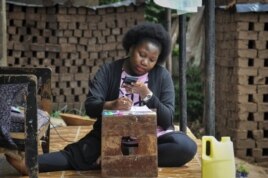23 July 2020
There seems to be many choices for students in Africa to continue studying while schools remain closed because of the coronavirus crisis. Lessons are taught on television or over the radio. Math problems appear in newspapers. Classes are held on video conferencing services like Zoom or WhatsApp.
But the truth is that many students will fall behind and possibly drop out of school forever. If that happens, inequality will worsen across an already unequal continent.
Mary Goretti Nakabugo is a literacy expert who runs a nonprofit education organization called Uwezo. It is based in Uganda.
Nakabugo told The Associated Press, "I think education now is more of an emergency than the health issue. Children, she added, "are completely helpless at the moment."
Nakabugo said that limited testing for COVID-19 means cases are likely undercounted in the East African country. But there have been no reported virus deaths in Uganda and just over 1,000 cases.
The coronavirus crisis has created education difficulties around the world. But the schooling crisis is even more severe in Africa, where up to 80 percent of students are unable to connect to the internet. Electricity is also sometimes not dependable, making distance learning difficult or even impossible. And, in normal times, schools often provide safety to children and offer services that their families cannot pay for.
Sub-Saharan Africa has more children who do not attend school than any other place in the world. The United Nations culture and education agency reports nearly one-fifth of children between the ages of six and 11, and over one-third of youth between 12 and 14, do not attend school.
In a report published this week, the charity organization Save the Children called the coronavirus crisis the "biggest global education emergency of our time." The report identified 12 countries in which children "are at extremely high risk of dropping out forever." Nine of them are in sub-Saharan Africa.
With the help of outside groups, some African governments have announced measures to support learning from home. But many have been limited by a lack of dependable electricity and poor internet connectivity. Even publishing lessons in newspapers can be too costly for people in some places.

Stella Maris Basemera, a mathematics teacher who heads a Uganda-based group of tutors called Creative Learning Africa, writes work for students to complete which she sends them as a private tutor via WhatsApp, at her home just outside Kampala, Uganda.
Uganda's government has promised to provide 10 million radios and over 130,000 solar-powered television sets. But officials have failed to honor other promises during the crisis, including giving free face coverings to everyone.
In neighboring Kenya, schools for young children and teenagers will remain closed through 2020. Yet colleges and universities can reopen in September. The decision means Kenyan students will repeat a school year, a situation commonly described as a "dead year."
The effects of school closures will not be limited to learning. A report by the Norway-based Christian Michelsen Institute said, "The critical consequences may be related to health, water and nutrition." That is because schools provide important services to many African young people, the development research organization noted.
School closures may deny students access to food and health programs -- and sometimes clean water.
Schools also provide protection for children from work and exploitation. Girls may especially suffer, says literacy expert Nakabugo. She noted several studies that have reported a rise in pregnancies among teenagers. The Norway-based group's report noted that the same thing happened during West Africa's Ebola crisis.
The shutdown could also mean many schools close permanently and many teachers quit, worsening what is already the world's worst teacher shortage.
Media reports in Uganda point to school owners who are looking to sell their properties or have turned student housing into apartments in order to pay their loans.
In the West African nation of Senegal, education officials tried to keep children learning by broadcasting some classes on television after schools closed in March. The move aimed to reach students without home internet access. But electricity is often lacking in villages.
At many schools in Zimbabwe, up to 70 students may be placed into a small room. The government is postponing a reopening plan that was supposed to start this month. Teachers unions, or labor groups, warned that such a plan was dangerous for schools lacking face coverings, personal cleaning products, and even running water.
Even in South Africa, the continent's biggest economy, the government has faced criticism. Teachers unions question the government's decision to reopen schools despite a growing number of cases.
I'm Pete Musto.
Rodney Muhumuza reported on this story for the Associated Press. Pete Musto adapted it for VOA Learning English. Ashley Thompson was the editor.
________________________________________________________________
Words in This Story
conferencing – n. the act of meeting formally in order to talk about ideas or problems related to a given topic, such as medicine or business)
drop out – p.v. to stop attending a school or university before you have completed your studies
literacy – n. the ability to read and write
charity – n. the act of giving money, food, or other kinds of help to people who are poor or sick
global – adj. involving the entire world
solar – adj. of or relating to the sun
consequence(s) – n. something that happens as a result of a particular action or set of conditions
access – n. a way of being able to use or get something
exploitation – n. the act of using someone or something in a way that is unfair
teenager(s) – n. someone who is between 13 and 19 years old
apartment(s) – n. a usually rented room or set of rooms that is part of a building and is used as a place to live
We want to hear from you. Write to us in the Comments Section.